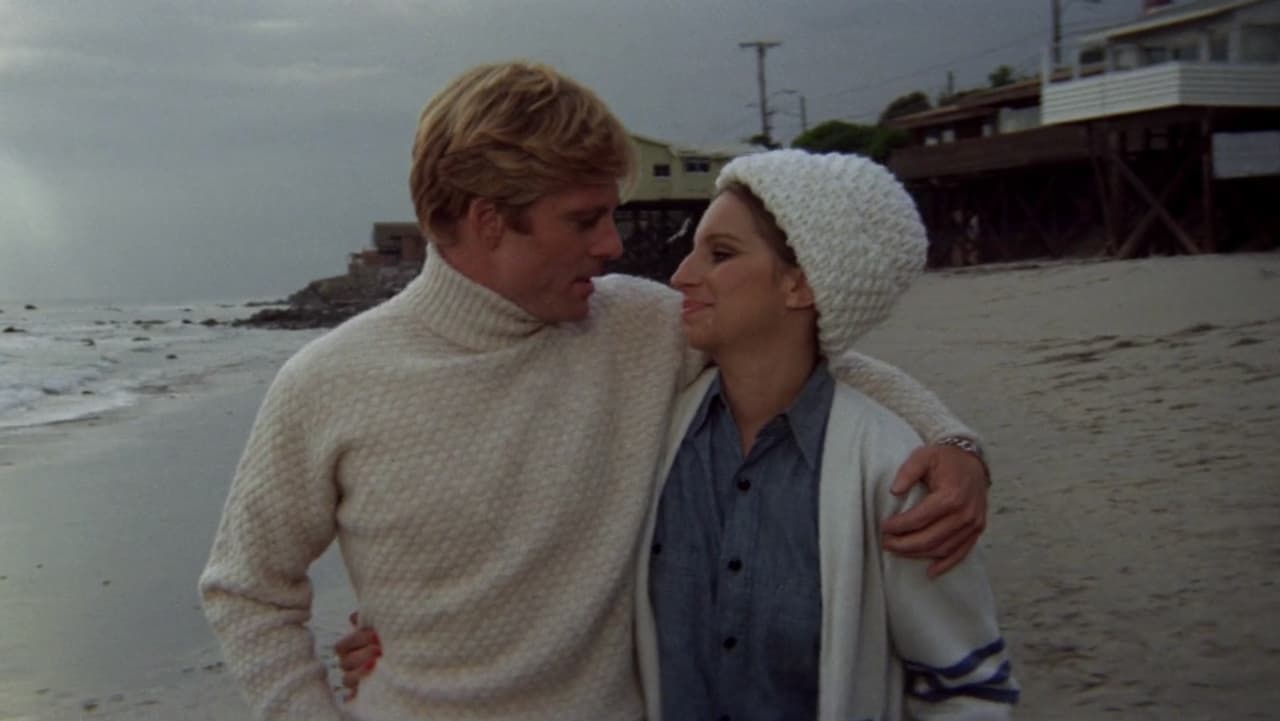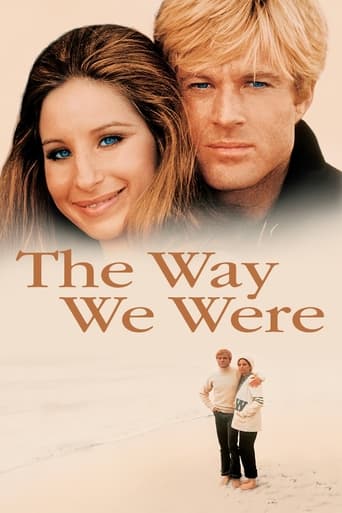

Self-important, over-dramatic, uninspired.
... View MoreBeautiful, moving film.
... View MoreA lot of perfectly good film show their cards early, establish a unique premise and let the audience explore a topic at a leisurely pace, without much in terms of surprise. this film is not one of those films.
... View MoreStory: It's very simple but honestly that is fine.
... View MoreOne of the screen's greatest romantic films. But it could have been a whole lot better. The scenes with Streisand and Redford together are lovely. Best when there is a tinge of wistful nostalgia and sadness in the plot. Unusual to have an intelligent romance in a film, as well as literary characters. But the political narrative is not handled well and becomes muddled. Maybe that and the Hollywood part of the plot could have been better directed. Beautiful score and title song won Oscars. Laurents could have won one for the screenplay too if it had been treated differently. Streisand and Redford are perfectly cast and are at their best. I love how marriage and divorce are never mentioned specifically. We never see the child and Hubbell's new wife (whose name we are not told) is all but invisible in her scene. I suppose this is to keep the plot as true as possible to its origin as a gay love story (before same sex marriage and adoption rights were legal).
... View MoreSydney Pollack directed the drama romance for the ages with his 1973 feature The Way We Were. Often cited as a large influence of American directors, The Way We Were explores what identity means to different people, and just how much of our identity we will sacrifice for the ones we love. Filmed against the backdrop of the changing political climate in America between the 1930's-1960s, The Way We Were is a beautiful illustration of the depths of love and what human beings will do to love and be loved. Barbra Streisand and Robert Redford give emotion-packed performances reminding audiences why they are viewed as the acting talents that they are. Katie (Barbra Streisand) and Hubble (Robert Redford) first meet in college in the late 1930's. Katie is known as the campus activist and can most often be found organizing a protest or a sit-in somewhere around campus. Hubble, on the other hand, can most often be found on a track or football field and is known for his athletic abilities. They couldn't appear to be any more opposite until Katie learns there is a deeply creative side to Hubble that he stifles to protect his jock image. Regardless of the differences that stand in their way, the two forge a friendship, then a relationship with each other. Katie is a Jewish Marxist, and interested in the social struggle of human beings everywhere, whereas Hubble is a privileged white male that has never had to work for anything in his life. Hubble is the epitome of the type of man that Katie would usually detest, but a fledgling writer herself, she is drawn to the passionately creative side that Hubble keeps under wraps. Desperate to bring this side of Hubble to the forefront of his personality, Katie prods and prods him until he finally relents and moves to California to focus on his writing full-time. Despite their glaring differences, Hubble also relents and begins a storied relationship with Katie as the two live in California in what should be blissful unity. The couple soon learns that neither are happy in their now stifled lives. Katie feels as though she put all of her political interests on the back burner while she was pushing Hubble to pursue his writing. Hubble feels as though Katie is not really the kind of woman he wants, as he seeks the old-fashioned, doting wives of his friends. Realizing, no matter how hard they try, their union is strained and not making either one happy, Katie and Hubble must make a decision that will affect them both for the rest of their lives. The Way We Were was beautifully shot, with wonderful images of the different cities the pair lived in constantly flooding the screen. From the glorious opening shot of this film, one can see that the camera work in The Way We Were is above compare. The rich coloration throughout the film really aids in the understanding of how infused the love between Katie and Hubble was. The acting was a treat in this film. From the understated hopelessly in love James Woods to the captivating chemistry between Streisand and Redford; there is no shortage of on-screen talent in any scene in this film. The pacing of this film was a little slow but is easily forgiven because of the way the slow pace allows the audience to see how at times deep, and at times agonizing the love is between Katie and Hubble. At one point or another in their lives together, Katie and Hubble are both making immense sacrifices of themselves. As their identities mature and develop in unison with each other, they are also at times both sacrificing themselves for the other. The overarching question becomes, just how much identity one is willing to sacrifice for the other. If you are fortunate enough to discover your own identity, never lose it for that of another. Many people navigate life never knowing themselves, let alone ever really knowing someone else. Love is essential to human existence, but not living true to oneself can end one's existence; The Way We Were is a beautiful illustration and reminder of such concepts.
... View MoreSchmaltzy, dull, irritating.Set in the period from the mid-1930s to the 1950s, a love story involving two markedly different people. Katie is an idealistic, uptight, Stalin-loving political activist. Hubbell is an easy- going, athletic, All American-type, and a talented writer. We see their different personalities affect their relationship and how they manage despite the differences...Pretty much your stereotypical romantic drama, but with added dullness and schmaltz. So long-winded and pointless.There is potential for profound statement, especially when we run into the McCarthy witch-hunts, but this is handled so heavy-handedly that the movie defeats its own purposes.Elevating the nausea is Barbara Streisand, and her character, Katie. One of the most irritating characters in cinematic history. The fact that Hubbell sticks with her despite her personality being so off-putting harms any credibility the relationship had.Robert Redford puts in a solid performance as Hubbell, and his presence probably gives us a clue to why this movie is so highly rated. The producers' idea was probably "Hey, how about a romantic drama, with Robert Redford in uniform for the majority of it. Women will love it!". Sure does look like they fell for the ploy...
... View MoreThe ultimate chick flick, 1974's The Way We Were follows Katie Morofsky, a serious-minded college student and radical who works overtime at very liberal political causes that have developed through the turmoil of WWII and though she is the hardest working gal on campus, things don't always go as effortlessly for her as she would like.Enter into Katie's life a guy named Hubbell Gardner (Robert Redford),a golden boy to whom everything comes easy and who takes life as it comes. Katie and Hubbell meet in college and she is immediately smitten with him, though she tries to fight it. Hubbell admires Katie's spirit, though he doesn't really love her, and from this springs one of the most moving and beautiful love stories ever put on celluloid, ending during the early 1960's.This movie draws you in immediately because Katie and Hubbell are both people that we can relate to and we understand their feelings for each other from the beginning and even though these people are polar opposites, we want to see them make this relationship work, which is further complicated by their conflicting political convictions. Katie is all about making a difference in the world and Hubbell wants to take things as they come and not quite as seriously as Katie does.The on screen chemistry between Streisand and Redford is off the charts and Streisand had to fight hard to get Redford to do the film. He rejected the role after reading the original script and Streisand had re-writes done immediately in order to beef up Hubbell's role.Pollack's sensitive direction and effective support from Bradford Dillman, Patrick O'Neal, and Viveca Lindfors also deserve mention here, but it is the magic chemistry generated by Barbra Streisand and Robert Redford that made this movie the instant classic it became. Needless to say, the classic Oscar winning theme song, flawlessly performed by Streisand, didn't hurt.
... View More